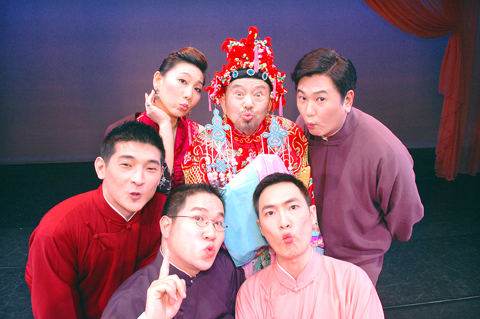The Yellow Crane Tower (黃鶴樓) of Wuhan, in China's Hubei Province, is the stuff of legend. First built during the Three Kingdoms (三國) period, over the centuries poets have waxed philosophical about it, architects have pondered its various styles, and historians have used it as a point of departure to discuss China's many dynasties.
Under the witty pen of Taiwanese comedian Wu Jau-nan (吳兆南), however, the Tower serves as part of a joke that a teacher is trying to convey to two dim-witted pupils. The dialogue is one of six taking place between a teacher and his students in Spring Sun Performing Arts Troupe's (春禾劇團) latest cross-talk performance called Wujiandao (吳間道), beginning tonight at Novel Hall.
Cross talk (相聲) is a style of Chinese comedy that employs complex wordplay in monologues or dialogues to mock a particular person or the preoccupations of society.

PHOTO COURTESY OF SUMMIT BRAIN NEW PRODUCTION AGENCY
With Wujiandao, Spring Sun takes aim at Taiwan's obsession with fame, money and the Chinese classics.
In one dialogue, the teacher uses the popular television series One Million Star (星光大道) as an example to teach students how to become famous. Another discusses how classical Chinese forms are used in modern writing.
Wujiandao will be performed at Novel Hall (新舞臺), 3-1 Songshou S Rd, Taipei City (台北市松壽路3-1號), today and tomorrow at 7:30pm and tomorrow and Sunday at 2:30pm. NT$400 to NT$1,200 tickets are available through NTCH ticketing.

Dissident artist Ai Weiwei’s (艾未未) famous return to the People’s Republic of China (PRC) has been overshadowed by the astonishing news of the latest arrests of senior military figures for “corruption,” but it is an interesting piece of news in its own right, though more for what Ai does not understand than for what he does. Ai simply lacks the reflective understanding that the loneliness and isolation he imagines are “European” are simply the joys of life as an expat. That goes both ways: “I love Taiwan!” say many still wet-behind-the-ears expats here, not realizing what they love is being an

Every now and then, even hardcore hikers like to sleep in, leave the heavy gear at home and just enjoy a relaxed half-day stroll in the mountains: no cold, no steep uphills, no pressure to walk a certain distance in a day. In the winter, the mild climate and lower elevations of the forests in Taiwan’s far south offer a number of easy escapes like this. A prime example is the river above Mudan Reservoir (牡丹水庫): with shallow water, gentle current, abundant wildlife and a complete lack of tourists, this walk is accessible to nearly everyone but still feels quite remote.

Google unveiled an artificial intelligence tool Wednesday that its scientists said would help unravel the mysteries of the human genome — and could one day lead to new treatments for diseases. The deep learning model AlphaGenome was hailed by outside researchers as a “breakthrough” that would let scientists study and even simulate the roots of difficult-to-treat genetic diseases. While the first complete map of the human genome in 2003 “gave us the book of life, reading it remained a challenge,” Pushmeet Kohli, vice president of research at Google DeepMind, told journalists. “We have the text,” he said, which is a sequence of

It’s a bold filmmaking choice to have a countdown clock on the screen for most of your movie. In the best-case scenario for a movie like Mercy, in which a Los Angeles detective has to prove his innocence to an artificial intelligence judge within said time limit, it heightens the tension. Who hasn’t gotten sweaty palms in, say, a Mission: Impossible movie when the bomb is ticking down and Tom Cruise still hasn’t cleared the building? Why not just extend it for the duration? Perhaps in a better movie it might have worked. Sadly in Mercy, it’s an ever-present reminder of just